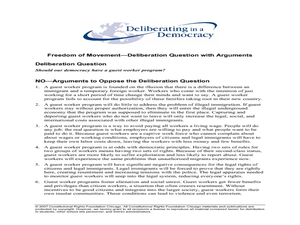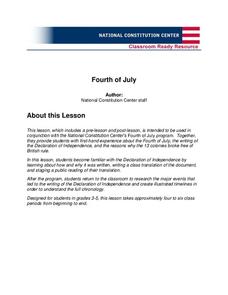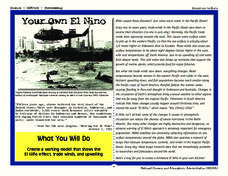National Endowment for the Humanities
Ratifying the Constitution
Ratifying the Constitution was no simple task. Using primary sources, such as classic writings from the Federalists and Anti-Federalists, young scholars examine the arguments for and against the Constitution. They then decide: Would they...
Curated OER
Powers of Congress: The Scope of Congressional Powers
Use this as a quiz or to guide reading. There are five true/false and five multiple choice questions for the class to answer. Topics covered relate to the type of power Congress has and the constructionists movement.
Center for Civic Education
What Basic Ideas About Government Are Included in the Preamble to the Constitution?
Young historians explore the meaning of the Preamble to the US Constitution in this upper-elementary social studies lesson. Working with partners or in small groups, children discuss the purpose of government before reading and analyzing...
National Park Service
Same Colors, Different Flavors
Who says getting to know your neighbors has to be difficult? The first resource in a three-part series creates an engaging project that teaches your scholars about Canadian culture. A question-and-answer format takes place via e-mail and...
Curated OER
We Must Not Be Enemies: Lincoln's First Inaugural Address
Students complete a unit of lessons on the historical context and significance of Lincoln's inaugural address. They analyze archival documents, campaign posters, historical photographs, and primary source documents, and listen to songs...
Center for Civic Education
What Basic Ideas Are in the Preamble to the Constitution?
Introduce young historians to the US Constitution with this upper-elementary social studies lesson plan. Beginning with a general discussion about the role of government in society, young scholars go on to work in small...
Louisiana Department of Education
Hatchet
Accompany a novel study of Hatchet by Gary Paulson with a unit consisting of 16 lessons focused on physical and emotional survival. Reading the story along with a variety of informational texts, scholars compare and contrast reading...
Deliberating in a Democracy
Freedom of Movement
Class members examine human migration. For this population lesson plan, they read an article entitled, "Freedom of Movement" and respond to discussion questions about the article related to guest worker programs.
Alabama Department of Archives and History
Alabama Tenant Farmers and Sharecroppers, 1865 to Present
The tenant farming and sharecropping systems that developed in the South after the Civil War, the reasons for their development, and the eventual decline of these systems are the focus of this two-day plan.
Center for Civic Education
To Amend or Not to Amend, That's Been the Question...Many Times
Looking for some ideas for how to celebrate September 17, Constitution Day? Check out a packet that focuses on the factors that are considered in the amendment process. Class members examine the amendment process and the types of...
Center for Civic Education
Historical Analysis of Constitutional Amendments
Each of the 27 Amendments to the U.S. Constitution were adopted within specific economic, political, social or cultural, and international contexts. As part of their Constitution Day/Week studies, seniors investigate these factors for...
Curated OER
The Legacy of Ancient Greece and Rome
Where did the inspiration for the US government system come from? From the ancient Greeks and Romans, of course. Scholars define nine terms relating to Greek and Roman government, complete a graphic organizer, and list the greatest...
Hyperion Publishing
Words We Live By: Your Annotated Guide to the Constitution
The language of the Constitution can feel quite ominous to young learners, but there are a variety of strategies you can utilize to help your class grasp the important concepts and ideals in our nation's founding document. This lesson...
National Constitution Center
Fourth of July (Grades 3-5)
Bring history to life for your young scholars with a Fourth of July lesson series. After a class reading of the Declaration of Independence, students translate this pivotal document into layman's terms before working in small...
National Science Teacher Association
Middle School Sampler: Science
Focus on inquiry-based learning in your science class with a series of activities designed for middle schoolers. A helpful packet samples four different texts, which include activities about predator-prey relationships, Earth's axis...
Cornell University
Glued into Science—Classifying Polymers
Explore the unique characteristics of polymers. A complete lesson begins with a presentation introducing polymers. Following the presentation, young scientists develop a laboratory plan for creating substances using polymers. They...
Curated OER
The Great Depression and Everyday Life
Examine everyday life during the Great Depression, as well as the effects if the Depression on American population, society, and economy. Learners write who, what, where, when, and why summaries of a person who relocated to California...
Curated OER
Voice of History
Way before the digital age radio was the medium of popular culture. After listening to excerpts from radio programs (easily available on the Internet), participants return to the radio age by creating a two-minute sketch based on a...
Center for Civic Education
What Is Authority?
Young scholars examine the concepts of power and authority as they begin learning about government in this elementary social studies lesson. Through a series of readings, discussions, and problem solving activities, children...
Center for Civic Education
What Does Returning to Fundamental Principles Mean?
Looking for materials for your Constitution Day and Citizenship Day lessons? Then check out this packet of activities that not only gets your class members thinking critically about the fundamental principles at the heart of American...
Curated OER
Executive Government: Executive Decision Making
Students make executive decisions. In this Social Studies lesson, students explore the concept of executive decisions through a game of chess. Students role play a year-level formal plan and implementation.
Curated OER
Great Depression: Brother, Can You Spare a Dime?
Add this presentation to your unit on the Great Depression as a strong informational supplement. With clear learning objectives, details on the 1929 stock market crash, and the effects of the Great Depression (though it's spelled...
Houghton Mifflin Harcourt
Surprise!: Challenge Activities (Theme 2)
Surprise! is the theme of this series of challenge activities. The surprise comes from the information your scholars will discover when researching topics such as alligators and crocodiles, living in other countries, becoming a...
NOAA
Your Own El Nino
Scholars make a model to discover how the force of trade winds over the Pacific Ocean creates an El Niño. Super scientists observe how the severe weather affects life in water and on land.























